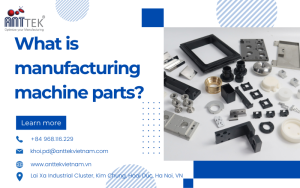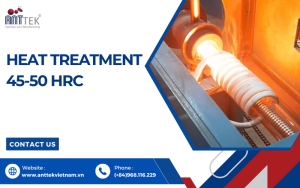Anttek Vietnam – Precision Mechanical Parts Processing
Precision mechanical parts processing is a critical field within manufacturing, playing a pivotal role in producing components that demand high accuracy, reliability, and performance. This process involves the fabrication of intricate and complex parts used in various industries such as aerospace, automotive, medical, and electronics. The importance of precision in this context cannot be overstated, as even the smallest deviation can lead to significant issues in the functionality and safety of the final product.
Understanding Precision Mechanical Parts Processing
Precision mechanical parts processing encompasses a range of techniques and technologies aimed at achieving exceptionally tight tolerances and superior surface finishes. The primary methods include:
CNC Machining
Computer Numerical Control (CNC) machining is a cornerstone of precision manufacturing. It uses computer-aided design (CAD) software to control machine tools, ensuring high precision in producing complex shapes and features. CNC machines can perform various operations such as drilling, milling, turning, and grinding with exceptional accuracy.

Electrical Discharge Machining (EDM)
EDM is a non-traditional machining process that uses electrical discharges to remove material from a workpiece. This method is particularly useful for hard materials and intricate shapes that are difficult to machine with conventional methods.
Laser Cutting and Engraving
Lasers provide high precision in cutting and engraving materials. They are widely used in industries requiring fine detail and accuracy, such as in the production of electronic components and medical devices.
The Importance of Precision
The significance of precision in mechanical parts processing lies in its impact on product performance, safety, and longevity. In industries like aerospace and medical devices, where the margin for error is minimal, precision machining ensures that parts meet stringent specifications and regulatory standards.
Aerospace
Aircraft components must endure extreme conditions and stresses. Precision machining guarantees that parts fit perfectly and perform reliably, which is crucial for the safety of the aircraft and its passengers.
Medical Devices
In the medical field, devices such as surgical instruments and implants require exact dimensions and flawless finishes to function correctly and avoid complications during use.
Advancements in Technology
The field of precision mechanical parts processing has seen significant advancements over the years, driven by technological innovations. Some notable developments include: Improved CNC Machines
Modern CNC machines offer higher speeds, better accuracy, and enhanced versatility, allowing for more complex and precise manufacturing.
Advanced Materials
The development of new materials, such as composites and high-performance alloys, has expanded the capabilities of precision machining, enabling the production of parts with superior properties.
Automation and Robotics
Automation has streamlined the manufacturing process, reducing human error and increasing efficiency. Robotic systems can perform repetitive tasks with high precision, ensuring consistency and quality.
Challenges and Future Trends
Despite its advancements, precision mechanical parts processing faces several challenges. One major issue is the high cost associated with maintaining the necessary equipment and technology. Additionally, the demand for ever-tighter tolerances and more complex geometries pushes the limits of current machining capabilities.
Looking forward, the integration of artificial intelligence (AI) and machine learning into precision machining processes is expected to revolutionize the field. These technologies can optimize machining parameters in real-time, predict tool wear, and enhance quality control, leading to greater efficiency and precision.
Moreover, the continuous evolution of additive manufacturing will likely play a significant role in the future of precision mechanical parts processing. As 3D printing technology advances, it will become possible to produce even more complex and precise parts, further expanding the possibilities in various industries.
Anttek Vietnam – Precision Mechanical Parts Processing

Anttek Vietnam is proud to be a leading CNC designer and machinist, providing high-quality and reliable products to customers. With many years of experience in the field of jig design and processing, Anttek Vietnam has been a reliable partner of domestic and foreign customers.
Contact us now to: IMPROVE PRODUCT QUALITY – OPTIMIZE COSTS – ENSURE DELIVERY SCHEDULE
For details, please contact:
- Factory: Lot 6, Lai Xa Industrial Zone, Kim Chung Commune, Hoai Duc District, Hanoi City, Vietnam
- Hotline: +84. 988. 688.336
- Email: truong.nx@anttekvietnam.com
- Website: https://anttekvietnam.vn
Precision mechanical parts processing is a vital component of modern manufacturing, ensuring that critical components meet the highest standards of accuracy and quality. Through advancements in technology and continuous innovation, this field will continue to evolve, driving progress in industries that rely on precision and reliability. As we look to the future, the integration of new technologies promises to enhance the capabilities and efficiency of precision machining, paving the way for even more remarkable achievements.

















